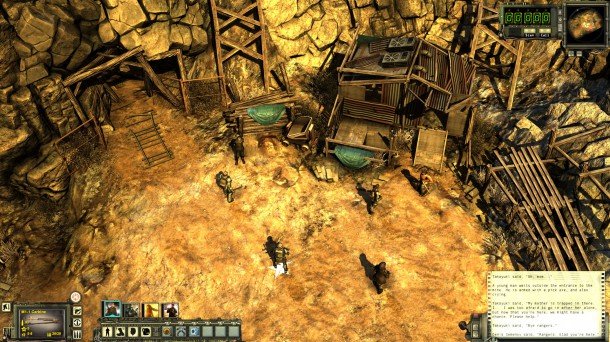Wasteland 2 hands-on: following the hobo code
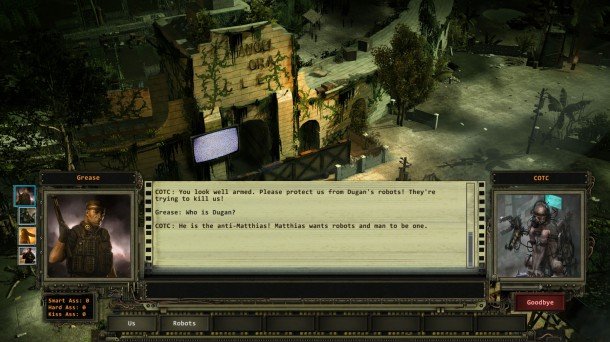
“I know what a high-profile Kickstarter project this is,” Brian Fargo tells me as his Razer Blade laptop loads another scene. He's about to show me Wasteland 2 , the Kickstarted turn-based RPG that's been his baby for a long, long time, and he feels the need to address the elephant in the room while we watch the loading bar fill. “There's the pressure from 60,000 people saying, 'Don't screw this up,' and then I've got all of my fellow developers who are saying, 'Brian, don't screw this up.'” He chuckles, but the pressure is real.
And it should be. Backers gave Fargo's inXile Entertainment almost $3 million to make the game, a sequel to the classic RPG that inspired Interplay—Fargo's company—to make Fallout. It's an RPG that feels like it stepped out of a time machine, that harkens back to the same era of open-ended structure and “hardcore” aesthetic as Larian's Divinity: Original Sin or Obsidian's Pillars of Eternity. Even more than those two fantasy RPGs, Wasteland 2 has to live up to its reputation of a seriously twisted post-apocalyptic world where anything can happen.
Scotchmo the hero
After the loading bar fills, Fargo shows me an optional quest where a bartender asks our party to save his shipment of Snake Squeezins, the most common alcohol in the wastes. The bartender only offers the quest if we complain about the quality of a drink in his establishment. As Fargo explains the conditions, we load into the encounter with the shipment itself, on a delivery truck that's ambushed by a rogue group of hobos. It looks as though the party will have to mow down some homeless to get the beer back.
Fargo clicks through some dialogue and then waits. After a few beats, but right before the party attacks, one of the party members rushes forward to try to save the day. His name is Scotchmo, a hobo NPC, and he implores his bum brethren to remember the “Hobo Code: we beg, we borrow, we do not steal!” The flock of hobos are properly shamed and begin to disperse.
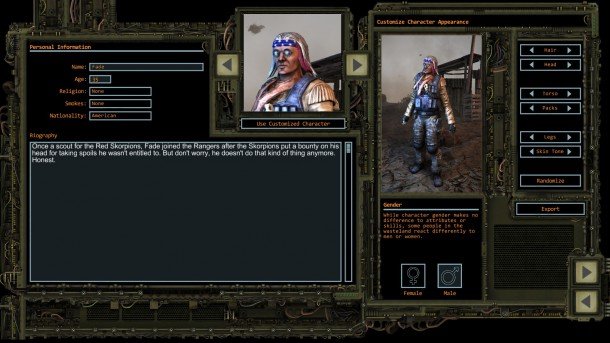
This is just one way to resolve the encounter, according to Fargo. “You could have come to the scene and started shooting right away,” he says. “Or if Scotchmo wasn't in your party, you could have defused the situation with one of your conversation skills, you could have bought a barrel for the hobos, or you could have started shooting the driver, which causes him to jump in the truck and drives over the hobos.” Fargo's point is that all of these consequences stem from an optional encounter in a bar, and he says the variety in the content is unprecedented.
Freedom of choice
Keep up to date with the most important stories and the best deals, as picked by the PC Gamer team.
Later, when I play the game on my own, I find myself facing branching decisions from the get-go. Wasteland's character creator feels like it was ripped from Fallout: ability scores such as “luck” and “coordination,” affect your chances to hit with a ranged weapon or talk your way out of a bad deal, while skills such as “toaster repair” or “animal whisperer” bend your character build toward some warped sense of usefulness. Wasteland doesn't have perks like Fallout, but you're given enough choices at the beginning to make a specialized character, and spending too deep in the strange skills will hinder your normal abilities.
After the Rangers send my merry band of wasteland misfits off to repair a radio tower, we immediately head off into the unknown. Roaming the wastes means moving an icon across the world map, with movement limited by the amount of water carried by my group. Not far from the Ranger Citadel, I receive two different distress calls: one for a settlement under siege by raiders, and another for a botanical area where the plants have come alive and are eating people. I can choose to head toward one or the other, but probably not save both.
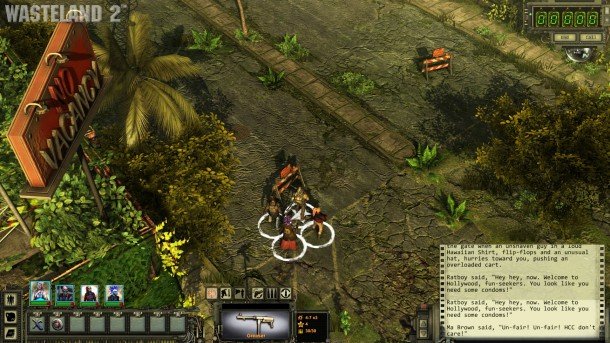
I rush to fight the plants, but never make it: a warren of giant rabbits ends my party's life after I underestimate their battle prowess, spending action points during the fight on poorly-aimed range attacks. The rabbits feast on our sun-bleached corpses, which is an embarrassing way to die.
I could have also gone rogue and left both settlements to their fates. Fargo says this is a perfectly valid option. “If you start killing innocents, Vargas and the Rangers will turn on you,” he tells me. “You'll get warnings, but after a while, he'll say, 'You're not Rangers, you're enemies.'” The choice means you won't make it to L.A., the big second chunk of the game beyond the radiation wall, but you'll get closure for your story. “Now they're going to send hit squads after you, and you'll either die or overthrow the rangers, and you get a full rolling credits screen and epilogue of everything that happened in the world based upon you being an A-hole.”
Building a world where you can do anything means Fargo's team has to account for the unaccountable, just like Larian had to when making Divinity: Original Sin . You can kill anyone in Wasteland 2, which means inXile has to have an effect for your every cause. The kicker is that your consequences may not be apparent for hours of play time. “My cause events and my effected events are often very far apart—hours apart,” Fargo tells me. “You can't just kick in a door and have a combat and figure out which result you like better and do it a different way. It's sometimes going to be hours later before you know what's happening.“
That sounds cool in theory, but I worry that the abundance of options will quickly become overwhelming, especially without a sense of how decisions will play out. Divinity worked around this issue by being flexible with auto and quick saves, but Wasteland's save options aren't as dynamic, and I'm not dying to replay four hours to undo a bad conversation choice.
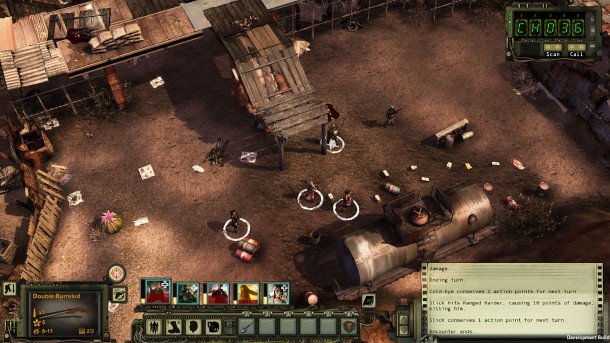
That said, the game itself feels good, even though it's incomplete. The Unity engine handles combat and movement well, and the dialogue system combines traditional dialogue trees with keyword triggers, which lets you type in specific conversation points that might not be apparent based on your dialogue options. That system rewards experimentation: if you played the first Wasteland, you should ask General Vargas at the beginning about his old nickname, “Snake.” It's small moments like this—and the countless story beats you may not even see, according to Fargo—that the team is working on now, and why the game has been delayed slightly until September.
Earning trust
Fargo says that Wasteland 2's more than 60 hours of gameplay is a consequence of his desire to “overdeliver” on content in the game. He tells me that inXile has put double the money from the Kickstarter into development, from catalog sales, early access profits, and his own money. I ask him if he worries about keeping the backers—the people who bought the game before it existed—happy.
“It's a relationship,” he replies. “And if you manage it well, it's like this monster, and when he's your monster, he's great. There are business decisions I could make that would make good business sense, but would piss [the Kickstarter backers] off. and you don't do those things. You have to be willing to leave money on the table in the interest of good will.”
“You make a social contract with these people, and they don't like to think of it as a business.” As an example, he mentions that inXile partnered with publisher Deep Silver to handle physical distribution for the game, which saved the development team $400,000. But some backers thought he had sold out, when in reality the company put that money back into making more expansive content for the wastes. “You have to really explain yourself,” he says. “You have to have really transparent reasons.”
